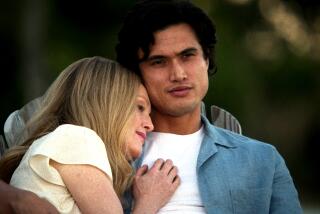Review: ‘Rachel Getting Married’
The Internet Movie Database, the mighty monarch of cinema sites, lists more than 600 films with the word “wedding” in the title. And no wonder. Where else can the passions of the moment, and recriminations born of unresolved family issues, mix to create the kind of emotional wallop that the best kind of cinema thrives on?
And so it is with Jonathan Demme’s exceptional “Rachel Getting Married.” Though the word “wedding” isn’t in the title, the film centers on the days and nights surrounding that fateful ceremony, as it examines the complex push-pull of families that don’t always get what they want but just might get what they need.
“Rachel Getting Married” is welcome for any number of reasons. It’s a gratifying return to his independent film roots for Oscar-winning director Dem- me, a powerful screenwriting debut for Jenny Lumet, a herculean job of hand-held cinematography by Declan Quinn and a career-changing performance by Anne Hathaway, of all people, as an ultra-troubled young woman set loose from rehab for her sister’s wedding.
Working as a resourceful ensemble, these individuals and others have managed to bring the unmistakable texture of edgy reality, reality both intensified and captured on the fly, to the proceedings. Unlikely as it seems at moments, “Rachel Getting Married’s” characters become people we care about, and we hope that their ability to navigate the shoals of family entanglements is sufficient to the occasion.
Best and most unexpected of all, “Rachel Getting Married” dares to mix the bitter with the sweet. It understands that life-altering situations like weddings not only bring out the worst in human behavior but also the finest. Because of Demme’s long-standing interest in music (he’s done documentaries with Neil Young, Talking Heads and others), all kinds of musical performances -- most memorably an a capella version of Young’s “Unknown Legend” by the groom (Tunde Adebimpe of the group TV on the Radio) -- run through this film like a river, suffusing it with joy at the moments it needs it most.
Everything starts with the script by Jenny Lumet, daughter of director Sidney Lumet. Her story is as much a multiple character study as a conventional drama, and it focuses on Kym (Hathaway), that vulnerable, troubled young woman, nine months and counting in rehab, an arch, sarcastic, compulsive talker who has trouble recognizing where her own needs end and other people’s boundaries begin.
With her chopped hair, constant smoking and wraith-from-hell demeanor, Kym calls on aspects of Hathaway, best known for considerably lighter fare like “The Princess Diaries,” “The Devil Wears Prada” and “Becoming Jane,” that simply have not been seen before, and the actress rises to the challenge beautifully, making Kym simultaneously empathetic and outrageous.
It’s not just that Kym has been an addict, she’s done things while under the influence that even she cannot forgive herself for.
Yet far from being contrite, Kym is quick to condemn everyone else. Determined to get the consideration she needs to feel whole, she lashes out at what she calls “the Salem witch trials” atmosphere in her family.
Kym wants desperately to fit in, to be a normal person, but she doesn’t know how to get there without pushing to be the center of attention, a place her sister Rachel (Rosemarie DeWitt) feels should be hers on this day of all days, especially as regards a father ( Bill Irwin) Rachel feels has always come down on Kym’s side.
Everyone in “Rachel Getting Married” is right by their own lights, and nowhere does this dynamic play out with greater impact than in Kym’s scenes with her divorced mother Abby, played with great effect by Debra Winger. It takes quite a bit to coax Winger in front of the camera these days, and this part elicits a performance from her that, though small, won’t easily be forgotten.
Helping give this story its essential air of reality is the decision Demme and cinematographer Quinn made to shoot it as what they call “the most beautiful home movie ever made.” The director chose not to plan shots in advance, instead giving Quinn (whose credits include Mira Nair’s “Monsoon Wedding”) the ability to respond in the moment to what was going on with the actors, and it’s a tribute to his ability (and that of editor Tim Squyres) that his camera always seems to be in the right place at the right time.
That planning-aversive decision is only one of a number of ways “Rachel Getting Married” could have gone off the rails. Lumet’s script could have come off as too melodramatic, and Demme’s decision to fill the film with people he knows (including his son Brooklyn Demme as a guitar player) could have made the proceedings seem like a home movie in the worst way. The fact that none of these bad things happened is a tribute to Demme’s firm but unobtrusive hand as a director.
A filmmaker for nearly 35 years, he has both the experience and the temperament to be a hang-loose perfectionist with this kind of off-the-cuff yet pointed material. You may not be able to put your finger on exactly what he’s done, but the effects of his talent are unmistakable.
“Rachel Getting Married.” MPAA rating: R, for language and brief sexuality. Running time: 1 hour, 56 minutes. In general release.
More to Read
The biggest entertainment stories
Get our big stories about Hollywood, film, television, music, arts, culture and more right in your inbox as soon as they publish.
You may occasionally receive promotional content from the Los Angeles Times.







